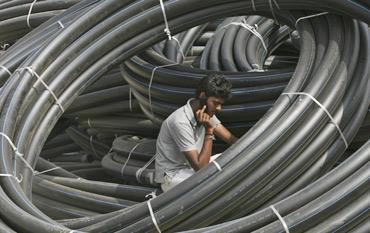 | « Back to article | Print this article |
'No evidence that mobile phones can cause cancer'
Long-term use of mobile phones may cause cancer, although there is "no convincing evidence" to suggest that, claims the biggest ever review of the subject.
The review, carried out by the British Health Protection Agency's Advisory Group on Non-ionising Radiation (AGNIR) found that a large number of studies have been published on cancer risks; but none of them had demonstrated that mobiles actually cause brain tumours or any other types of cancer.
A small number of individual studies have claimed to have found evidence of a link between heavy mobile phone use and increased brain tumour incidence.
Two years ago, the INTERPHONE study had reported that the heaviest users could be at a 40 per cent increased risk of developing glioma, a common type of brain cancer. But, most studies have found no such association.
Click NEXT to read further...
'Need to keep watch on national cancer trends'
Launching the 333-page report, which reviewed hundreds of studies, Professor Anthony Swerdlow, Chairman of AGNIR, said: "I think there is a need to keep a watch on national cancer trends in relation to this, particularly with brain tumours."
"So far brain tumour rates are not rising in the sorts of age groups who have had exposure for 10, 15 years. But if this is something that takes 15, 20 years or more to show up... we need to keep watch over rates just in case," Prof Swerdlow was quoted as saying by the Daily Telegraph.
Prof Swerdlow, also an epidemiologist at the Institute of Cancer Research, said that researchers running cohort studies -- projects following individuals' health over their lifetimes -- also needed to investigate the matter to see if heavy users of mobile phones tended to develop brain tumours more than others.
Click NEXT to read further...
'Excessive use of mobile phones by children should be discouraged'
The review found no evidence that radiofrequency (RF) electromagnetic fields caused by wi-fi -- now widespread in schools, homes and the workplace -- caused harmful effects, or could even be detected by those who claimed to be sensitive to it, the researchers said.
Neither did it find any evidence that mobile phone mast transmitters caused health problems, they said and recommended that "excessive" use of mobile phones by children should be discouraged while adults should make their own decision.
Dr John Cooper, Director of HPA's Centre for Radioation, Chemical and Environmental Hazards, said: "There is still no convincing scientific evidence that radiofrequency (RF) fields exposures from mobile phones and other radio technologies affect human health at exposure levels below internationally agreed guidelines.
"However, as this is a relatively new technology, the HPA will continue to advise a precautionary approach and keep the science under close review.
Click NEXT to read further...
'Hands-free kits reduce exposure'
"The HPA recommends that excessive use of mobile phones by children should be discouraged and mobile phone Specific Energy Absorption Rates (SAR) values should be clearly marked in the phone sales literature."
Dr Simon Mann, another member of AGNIR, said: "We are continuing to recommend discouraging non-essential use by children."
Texting was preferable to calling, he said, as it meant the phone was "tens of centimetres away (from the head) rather than one or two", reducing exposure levels by "orders of magnitude".
"Hands-free kits reduces your exposure, as does using third generation (3G) modes rather than second generation (2G), and shorter calls," he added.
Click on NEXT for more...
TOP photo features of the week
Click on MORE to see another set of PHOTO features...




